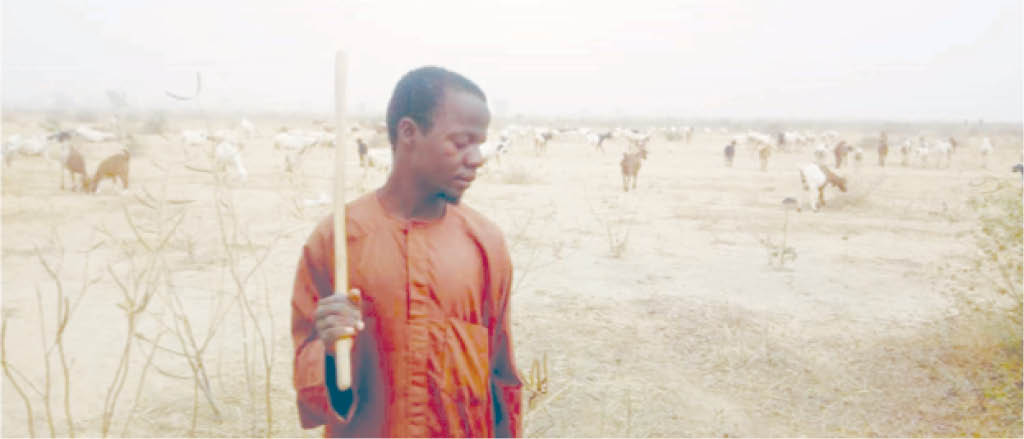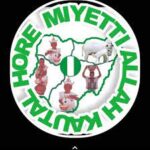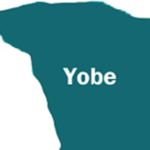The story of Sharif Gadi, a blind shepherd in Damaturu, written by Kanem Trust was so emotional that it attracted some good Samaritans to contribute a flock of sheep to change his life.
Gadi, who lives in Maisandari, a suburb of Damaturu, the state capital of Yobe, tends flock of sheep and goats at a far-off bush every day.
- Printers, publishers’ union condoles Media Trust over board member’s death
- Abuja residents panic as CBN issues security alert to staff
It’s strange for visitors to see a blind man controlling a large herd but, for Gadi, it’s a hobby from childhood that later turned into a source of livelihood.
From the last time that Kanem Trust visited Gadi – 18 months ago – there were lot of changes in his life but his instinct, talent, and the skill he uses to tend his flock remained constant.
Every day, this blind shepherd collects at least 500 sheep and goats at the doorsteps of their owners, who pay him N50 per head, weekly, to guide them to the meadow.
Gadi treks a distance of at least 3km to seek pasture for their flocks daily. A business he has been doing for more than a decade without a single animal called his own.
Reading about his plight, a CEO of Abuja-based company and another anonymous person contributed a flock of 10 sheep to Gadi – two rams and eight ewes. It was his prayer to have a herd of his own.
For Gadi and his family, his prayer was answered, because his dream from childhood was to have animals of his own.
His elder brother, Aisami Kachalla, told our correspondent that, at the age of six, Gadi use to tie rags and nylons to toy around as flock.
“It’s his dream to be a herdsman, he pursued it the hard way. I’m very happy that God has made his dream possible by sending good people that help him own his flock,” he said.
The last time this reporter visited Gadi, in the same compound where he kept his herd, fowls and pigeons were also there. He said they are an extra source of income for him.
“I always feed these birds before leaving for the bush,” he told me Feed, drugs became problem Gadi, who spoke to our correspondent in a low tone said he was very happy when he received the flock, thinking that all his problems were solved until two months later when the feed brought with the animals finish.
“The good Samaritans brought 10 sheep with bags of feeds, and it was so very easy for me at the start. Two months later, all the donated feed finished and I started using my saving to buy. At a point, I had nothing left to buy.”
He said, at that time, it was rampaging dry season in Damaturu and the entire northeast, “the scanty remain of the dried grasses in the bush will not satisfy them, so whenever we returned home, I must look for feed to supplement it”.
Dry season in the most northeastern part of the country normally commences around October spanning through May in the succeeding year is characterized by absolute dryness, a most trying period for herders as they usually find it extremely difficult to feed their livestock.
The season is the most feared period among livestock rearers including Gadi as it is one of the major factors that is inducing malnutrition among animals.
Visiting the meadow where Gadi tends his animals at this time, what is clearly visible on the grazing land are abundant shrubs and scantly remains of dried grasses.
And a strange disease struck again, Gadi had to battle with a strange disease that took away his herd. Though he was not discouraged, it was a fresh challenge for him to contend with.
“I started very well when the flock was donated to me. All the six ewes got pregnant before disease struck. Two gave birth to twins, each, but later died together with the lambs. I also sold one sheep to cure and feed the remaining two.
“Before the disaster, I slaughtered one ram as sacrifice for last Eid-el-Kabir, so I’m now left with only two,” he said.
Gadi said the strange disease struck when the rainy season set in and, gradually, the animals fall sick and started dying.
“We tried all the traditional methods to save them but they kept getting weak on the daily basis. We later engaged a veterinary doctor to no avail. It’s not easy seeing your life’s hope slipped away” he added.
He said, after the disease took away his herd, he submitted everything to God and concentrated on the business of tending people’s herds.
“As God has it, the person who gave me seven sheep learnt about my predicament and sent me another four.
That actually renewed my hope and I now have five pregnant ewes but feeding them around this season is very difficult,” he said.
Gadi said that keeping goats is easier ] in terms of feeding, “Goat picks food even on the street and moves on but sheep needs to be fed properly before it reproduces well”.
When contacted, a veterinary doctor, Aisha Abubakar, said it might not likely be a strange disease that killed the sheep.
“You see, at the beginning of the rainy season, fresh grasses will germinate, the starving animals will graze on it combine with the soil. Eating that soil is always dangerous to the animals.
“We always advise herders to sell a portion of their livestock and buy feed for the remaining ones to avoid losing them all. Because, once an animal is starving, it will eat anything that comes handy,” she added.
– How Gadi’s employers shortchange him To earn more money for his animal feed, Gadi collects more sheep and goats from owners in the society but most of them default in paying the N50 per sheep, weekly.
He said, sometimes, the animal owners will wait for him outside the town and sneak in their flock to avoid payment.
“They think that I wouldn’t know. Yes, I’m blind but I can identify each and every sheep and goat when it bleats.
“Sometimes, owners are surprised when I approach them on why they sneaked in their herd. They will promise to pay but they would not.
“It’s always very sad when they come to disturb me that their goat or sheep didn’t return home, as if I sold them. This pains me more than anything.
“At times their ram will chase other people’s sheep and I must go and get it for them. If you don’t have the map and the knowledge of herders that operate in the bush, how will you start looking it?
“Sometime I will trek 3km inside the bush to get the animal from Fulani settlement. Yet, they will not pay me.
When this reporter asked Gadi, whether he will abandon the herding if the government or a philanthropist decides to enroll him in school, he said, “I don’t think that will be possible, this business is what I wanted to do and I’m not going to give up on it”.

 Join Daily Trust WhatsApp Community For Quick Access To News and Happenings Around You.
Join Daily Trust WhatsApp Community For Quick Access To News and Happenings Around You.

